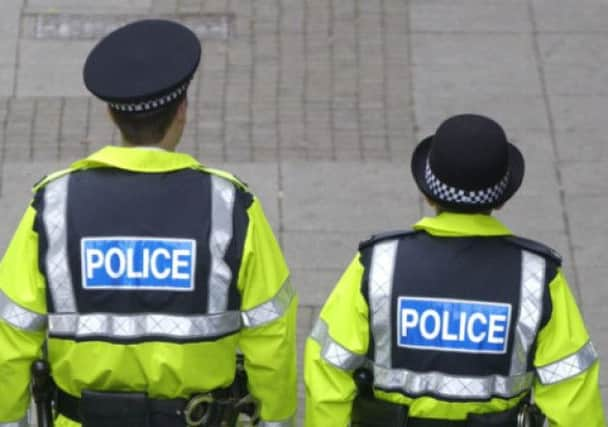Scots police have twice stop and search rate of Met


About one in five of these produce results with drugs, weapons and alcohol seized by officers who insist it is a key tool in cutting crime and “not random”.
But there are growing concerns about the way stop and search is being used, with campaigners warning that officers are “stretching the meaning of reasonable suspicion”.
Advertisement
Hide AdAdvertisement
Hide AdThere were 519,213 searches in the first nine months after the new national force Police Scotland was formed between April and December last year. This equates to a daily average of 1,923 – more than twice the level of 850 for the Metropolitan Police in London.
Assistant Chief Constable Wayne Mawson, said: “Stop and search is one of a number of tactics that frontline police officers within our communities are able to apply, if and when they have reasonable grounds to do so. Searches are targeted and intelligence-led and often conducted with the consent of those involved.”
The number of searches has fallen slightly in Scotland; they are about 0.2 per cent down compared with the same period in 2012 and there has been an increase in positive results from 13.9 per cent to 19.7 per cent.
About one third of searches concerning stolen property produced results, with more than 11,000 stolen goods being recovered.
The searches which provided the highest positive results were those carried out in relation to alcohol.
Almost 37 per cent of alcohol-related searches were positive and 61,541 recoveries were made.
But Richard Haley, chairman of Scotland Against Criminalising Communities said yesterday that the number of cases which lead to prosecution are “very small”.
He added: “As a campaign we’ve had people getting in touch with us where they’ve been stopped and searched by the police and the police have failed to give them any reason at all why it was happening.”
Advertisement
Hide AdAdvertisement
Hide AdHe is hoping that individuals in this situation will take police to court over this to test the issue.
The fear is that people are being stopped because they are “individuals of interest” to the police and not because they are behaving in any suspicious way.
“It looks like the police are searching people in situations where they believe they have justification but it’s probably quite a tenuous one,” Mr Haley added.
The Met has been plunged into crisis over its approach to stop and search in the aftermath of the killing of Mark Duggan, which brought race relations with the police to a head.
Ethnic minorities were being disproportionately affected and a more targeted approach resulted in searches being cut in London by 77,000 in 2013 to 312,000. This is about 200,000 fewer than Scotland in just nine months, despite similar populations.
Scotland’s justice secretary, Kenny MacAskill, joined officers in Fife yesterday as the figures were unveiled and insisted it is a “preventative and proportionate” approach.
“Stop and search is one tactic amongst many police use to cut crime, and Police Scotland’s positive results so far suggest this is working,” he said.
Recent crime statistics show violent crime fell by 47 per cent in recent years, while crimes involving carrying a weapon are at a 27-year low.
Advertisement
Hide AdAdvertisement
Hide AdEach of the 14 local policing divisions within Scotland has responsibility for using stop and search whenever it is deemed necessary to support local community policing priorities.
In Fife, searches have yielded results in almost a quarter of all undertaken, and Chief Superintendent Garry McEwan, divisional commander for the area, said they have helped cut violence and disorder.
He said: “These are used in the main against known offenders, and in localities identified through crime pattern analysis as having persistent problems of violence or antisocial behaviour.
“These powers can also be used where police officers have reasonable cause to suspect anyone of committing particular crimes or offences.
“These are not random searches, but an integral part of our strategy for keeping people safe and preventing violent crime in Fife.”
IN NUMBERS
519,213 the number of stop and searches in Scotland between April and December 2013
312,645 stop and searches were carried out in London in all of 2013
0.2% the reduction in searches in Scotland compared with the April-December period in 2012
20% the reduction in London between 2013 and 2012
Advertisement
Hide AdAdvertisement
Hide Ad19.7% the proportion of searches in Scotland which produced positive results
11,000 stolen goods recovered as a result of stop and search in Scotland
166 firearms seized by officers in searches
4,273 other weapons, including knives seized by police
37% the proportion of alcohol-related stop and searches which proved positive
30 complaints made by
victims of stop and
searches in Scotland
Put lives before civil liberties says stabbing victim’s mother
Mary Stark’s son Sean was stabbed to death on her birthday in Lochgelly in 2009.
She said civil liberty concerns around stop and search should be put to one side for the safety of Scotland’s communities.
Ms Stark, 52, said: “The last three years have been devastating.
“I would just urge people not to carry knives, not to use knives, don’t put yourself in that situation.
Advertisement
Hide AdAdvertisement
Hide Ad“Think about what will happen to the other person, to yourself, and to your families.” Mr Stark’s brother David, 33, said increased use of stop and search could have saved his brother.
He said: “It is utterly devastating what our family has been through.
“We will do anything to try to help other families – even if it’s only a few or just one who are spared this kind of thing.”
She joined Scottish justice secretary Kenny MacAskill at an event held at Police Scotland’s Fife Division headquarters in Glenrothes to unveil the latest stop and search figures.